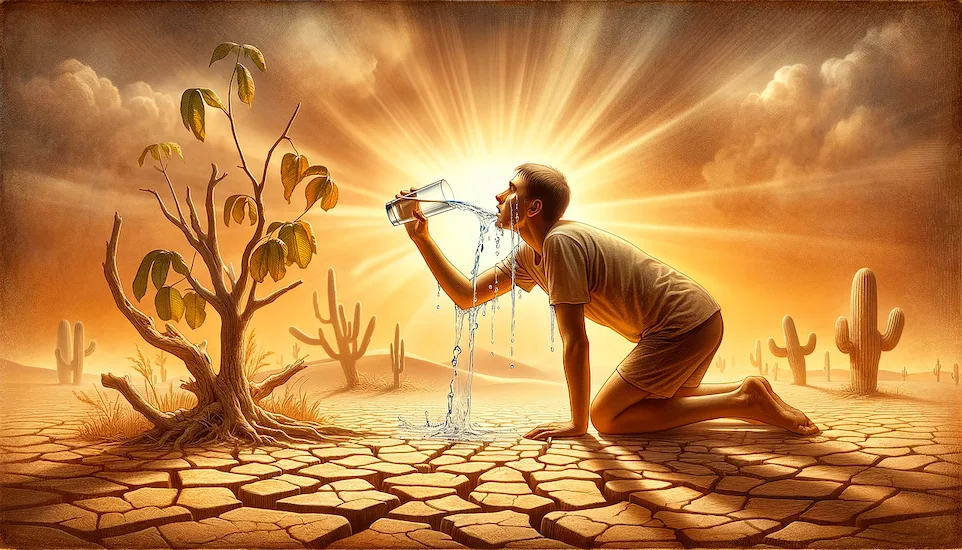Climate Change: The Reason Behind Rising Heat
June 04, 2024
Environment Science

Climate change is one of the most pressing issues of our time, impacting every corner of the globe. One of the most noticeable effects of climate change is the increase in global temperatures, leading to rising heat levels that affect ecosystems, human health, and economies. In this blog, we will explore the reasons behind the rising heat, the consequences of these changes, and what can be done to mitigate the impact of climate change.
Understanding Climate Change
What is Climate Change?
Climate change refers to significant and lasting changes in the Earth's climate patterns over an extended period. While the climate has naturally fluctuated throughout Earth's history, the current trend of rapid warming is largely attributed to human activities, particularly the burning of fossil fuels and deforestation.
The Greenhouse Effect
The primary driver of climate change is the greenhouse effect. The Earth’s atmosphere contains gases like carbon dioxide (CO2), methane (CH4), nitrous oxide (N2O), and water vapor, which trap heat from the sun. This natural process keeps our planet warm enough to sustain life. However, human activities have increased the concentration of these greenhouse gases, enhancing the greenhouse effect and leading to global warming.
Human Activities and Rising Heat
Burning of Fossil Fuels
The burning of fossil fuels—such as coal, oil, and natural gas—for energy is the largest source of greenhouse gas emissions. When these fuels are burned, they release significant amounts of CO2 and other greenhouse gases into the atmosphere. This process occurs in power plants, transportation (cars, planes, ships), and industrial activities.
Deforestation
Forests act as carbon sinks, absorbing CO2 from the atmosphere. Deforestation, primarily for agriculture and urban development, reduces the number of trees available to absorb CO2, increasing the concentration of greenhouse gases. Additionally, the burning of forests releases stored carbon back into the atmosphere.
Agriculture
Agricultural practices contribute to climate change through the release of methane and nitrous oxide. Livestock, such as cows and sheep, produce methane during digestion. Additionally, the use of synthetic fertilizers releases nitrous oxide. Both of these gases have a much higher global warming potential than CO2.
Industrial Processes
Certain industrial processes release greenhouse gases as byproducts. For example, the production of cement, steel, and chemicals emits large quantities of CO2. Additionally, the use of certain gases in refrigeration and air conditioning has a high global warming potential.
Consequences of Rising Heat
Extreme Weather Events
One of the most direct consequences of rising heat is an increase in the frequency and intensity of extreme weather events. These include heatwaves, droughts, hurricanes, and heavy rainfall. Such events can have devastating impacts on communities, economies, and ecosystems.
Melting Ice and Rising Sea Levels
As global temperatures rise, ice sheets and glaciers are melting at an accelerated rate. This melting contributes to rising sea levels, which can lead to coastal flooding and erosion. Small island nations and low-lying coastal areas are particularly vulnerable to these changes.
Ocean Warming and Acidification
The world’s oceans absorb much of the excess heat from global warming, leading to ocean warming. Warmer oceans can disrupt marine ecosystems, affecting fish populations and coral reefs. Additionally, the absorption of CO2 by the oceans leads to acidification, which harms marine life, particularly shellfish and coral.
Impact on Ecosystems
Rising temperatures can alter ecosystems and biodiversity. Species that cannot adapt to the changing climate may face extinction. Changes in temperature and precipitation patterns can also affect plant growth, impacting agriculture and food security.
Human Health
The rising heat poses significant risks to human health. Heatwaves can lead to heat-related illnesses and deaths, particularly among vulnerable populations such as the elderly and those with pre-existing health conditions. Additionally, changing climate patterns can influence the spread of infectious diseases, such as malaria and dengue fever.
Mitigating Climate Change
Reducing Greenhouse Gas Emissions
The most crucial step in mitigating climate change is to reduce greenhouse gas emissions. This can be achieved by:
- Transitioning to Renewable Energy: Shifting from fossil fuels to renewable energy sources like solar, wind, and hydropower can significantly reduce emissions.
- Improving Energy Efficiency: Enhancing energy efficiency in buildings, transportation, and industry can lower energy consumption and emissions.
- Adopting Sustainable Agricultural Practices: Practices such as precision farming, organic agriculture, and agroforestry can reduce emissions from agriculture.
- Promoting Reforestation and Afforestation: Planting trees and restoring forests can help absorb CO2 from the atmosphere.
Policy and International Cooperation
Governments play a crucial role in addressing climate change through policy and regulation. International agreements, such as the Paris Agreement, aim to unite countries in the effort to limit global warming to well below 2 degrees Celsius above pre-industrial levels.
Individual Actions
Individuals can also contribute to mitigating climate change by making sustainable choices in their daily lives. This includes reducing energy consumption, using public transportation, recycling, and supporting environmentally-friendly products and practices.
Conclusion
Climate change is a complex and urgent issue that requires immediate action from individuals, governments, and the global community. The rising heat is a clear indicator of the profound impact that human activities have on the planet. By understanding the reasons behind climate change and taking steps to mitigate its effects, we can work towards a more sustainable and resilient future. The challenge is significant, but the potential benefits of a stable climate and healthy planet are well worth the effort.